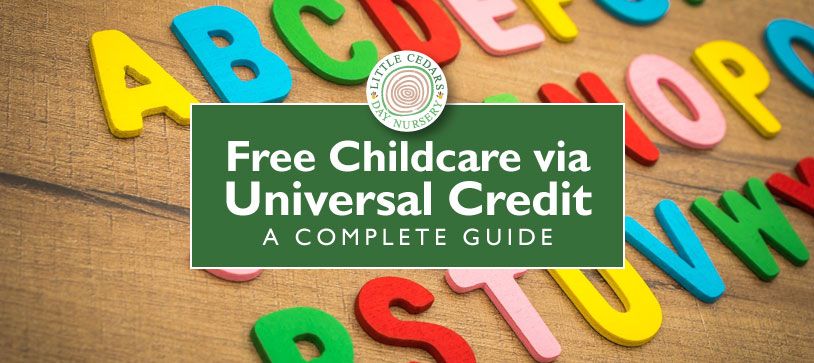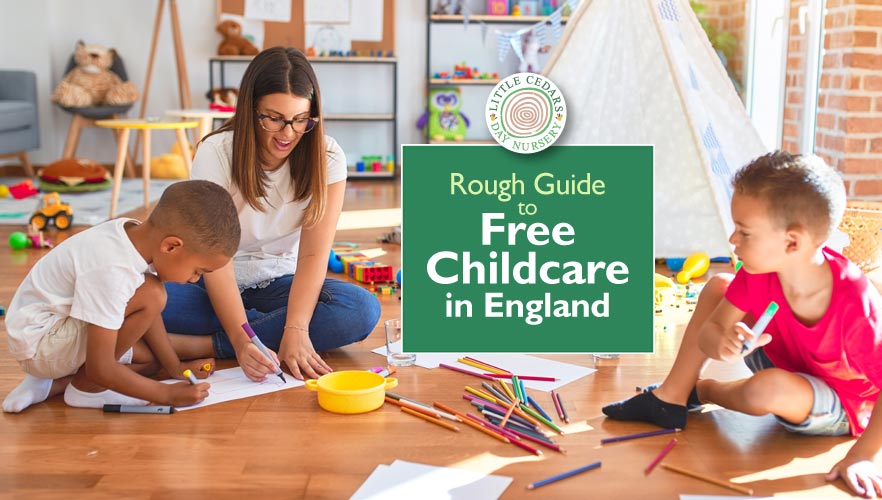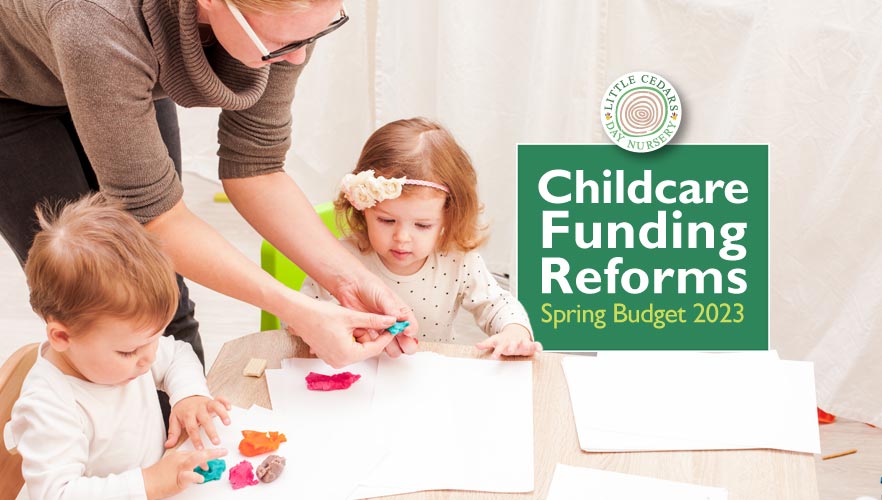
 Welcome to our guide to free childcare available specifically via Universal Credit. This builds upon our previous childcare funding guides, giving parents yet another potential way to get financial help towards childcare costs. Which scheme suits you best rather depends upon your individual situation as each has its own rules for eligibility. If one scheme doesn’t fit with your situation, another may. You may even find that you can apply for multiple schemes in certain circumstances, and we’ll also touch upon that in this guide. (To view our previous guides on other funding schemes, see our Rough Guide to Free childcare Funding in England and our Complete Guide to the Tax-Free Childcare Scheme).
Welcome to our guide to free childcare available specifically via Universal Credit. This builds upon our previous childcare funding guides, giving parents yet another potential way to get financial help towards childcare costs. Which scheme suits you best rather depends upon your individual situation as each has its own rules for eligibility. If one scheme doesn’t fit with your situation, another may. You may even find that you can apply for multiple schemes in certain circumstances, and we’ll also touch upon that in this guide. (To view our previous guides on other funding schemes, see our Rough Guide to Free childcare Funding in England and our Complete Guide to the Tax-Free Childcare Scheme).
Anyway, let’s get back to childcare funding specifically from Universal Credit …
Firstly, what is Universal Credit?
Universal Credit is a Government funding system that was introduced in 2013 to simplify the welfare payment system. In essence, it helps people with their living costs, for example if they’re on low incomes or are not working. It also potentially includes funding for childcare, to help parents with the costs of looking after dependent children (more about that later). The scheme’s aim is to eventually replace 6 existing benefits** into a single, unified payment scheme. Payments are made monthly in England (sometimes twice a month in Scotland).
How much can you get towards childcare with Universal Credit?
If you are eligible, you may be able to reclaim up to 85% of childcare costs through Universal Credit. The most you can reclaim each month is usually £950.92 for one child or £1,630.15 for two or more children (figures have been updated for 2023) unless there are exceptional circumstances. You may also be able to claim for additional children under the scheme, but only if they were born before 6th April 2017. If eligible, you can claim for dependent children up to the 31st of August following their 16th birthday.
Your payments for childcare costs under the scheme are usually paid in arrears. This means you will need to pay the costs yourself and then claim the money back through your Universal Credit claim. (2023 UPDATE: Following childcare funding reforms announced in the Chancellor’s Spring Budget in 2023, however, there are exceptions — good news for those struggling the most).
The amount you are paid in your job, if you have one, can affect how much your Universal Credit payments will be. If your earnings are more than usual in an “assessment” period, this can reduce your Universal Credit payment, including the amount of any help towards childcare costs.
Eligibility criteria
 To be potentially eligible for childcare help through Universal credit, you must live in the UK, be on a low income or out of work and be aged 18 or over (although there are some exceptions for 16 and 17 year olds). You and your partner, if you have one, must also be under State Pension age and have no more than £16,000 in savings/investments between you.
To be potentially eligible for childcare help through Universal credit, you must live in the UK, be on a low income or out of work and be aged 18 or over (although there are some exceptions for 16 and 17 year olds). You and your partner, if you have one, must also be under State Pension age and have no more than £16,000 in savings/investments between you.
You, and you and your partner, if you live with them, usually* need to be employed or have an offer of employment, and be paying for childcare for a child or young person. Paid work does not include being engaged by a charity or a voluntary organisation or being a volunteer where the only pay is expenses. Also, if you stop work, you must inform Universal Credit of the change in your circumstances.
* Childcare costs may still be paid if one partner is employed and the other cannot look after the child/children because they have limited capabilities for work and work-related activities, care for a disabled adult or child, or are temporally absent from the household (e.g. in hospital, residential care or in custody).
You will not be eligible for Universal Credit if you already receive, or are eligible for, Severe Disability Premium.
Claiming back your childcare costs
You will need to tell the Department for Work & Pensions (DWP) about costs of your childcare before the end of the “assessment period” following the one you have paid the fees for. This can be confirmed online via your Universal credit Account. In effect, you are then refunded for any eligible childcare payments via your Universal Credit payment. You can claim up to 3 assessment periods of childcare at a time. To get your childcare costs refunded and to avoid missing out, you should report the childcare costs as soon as possible after you have paid them.
What if you’re off sick or on maternity/paternity leave?
You can still get Universal Credit childcare costs for existing childcare if either you or your partner are receiving Statutory Sick Pay, Statutory Maternity Pay, Statutory Adoption Pay, Statutory Paternity Pay, Statutory Shared parental Pay or Maternity Allowance.
What if you’re changing jobs, or coming to the end of one?
 If you have been offered new employment, you can ask for childcare costs for the month preceding the start of your new job. If you are coming to the end of your employment, you must inform the Department for Work and Pensions (‘DWP’) immediately. Help with childcare costs can be claimed at least a month after your employment ends to help you maintain childcare as you switch jobs.
If you have been offered new employment, you can ask for childcare costs for the month preceding the start of your new job. If you are coming to the end of your employment, you must inform the Department for Work and Pensions (‘DWP’) immediately. Help with childcare costs can be claimed at least a month after your employment ends to help you maintain childcare as you switch jobs.
What if you’re still receiving the ‘old’ Tax Credits?
** A few people remain in the ‘old’ schemes that were in place before Universal Credit came into being. These are Child Tax Credit, Housing Benefit, Income Support, Income-based Job Seekers Allowance (JSA), Income-related Employment & Support Allowance (ESA) and Working Tax Credit. If you’re still receiving benefits through one of those, it seems that there is no need to apply for Universal Credits unless you have a change of circumstances that needs to be reported, or you are requested to do so by the DWP.
TIP: It’s important to know that any existing Tax Credits will end once you or your partner apply for Universal Credit — even if you are not successful in your application. So, the message is: if you are receiving Tax Credits check your eligibility and do your research carefully before applying for Universal Credit.
What if you receive childcare vouchers?
If your childcare costs are met by a third party, for example via childcare vouchers supplied through an employer, you can only claim back the balance which you or your partner actually paid yourselves. However, earnings that have been converted into childcare vouchers do not need to be included when working out reductions to your Universal Credit pay.
What if you’re already receiving 15 or 30 hours free childcare funding?
You may still be entitled to apply for the 15 or 30 hours free childcare funding. Universal credit may be able to help towards any additional childcare costs over and above the 15 or 30 hours each week.
Can you only use one childcare provider?
 You can have more than one childcare provider. However, to apply for Government help with childcare you must use a registered/approved childcare provider. This generally means that the childcare provider is registered with Ofsted for England, The Care Inspectorate for Scotland or the Care and Social Services Inspectorate Wales (‘CSSIW’) for Welsh settings.
You can have more than one childcare provider. However, to apply for Government help with childcare you must use a registered/approved childcare provider. This generally means that the childcare provider is registered with Ofsted for England, The Care Inspectorate for Scotland or the Care and Social Services Inspectorate Wales (‘CSSIW’) for Welsh settings.
You will need to tell Universal Credit details of the childcare providers you are using. These may include providers supplying childcare via a school, play scheme, nursery, club, a childminder or childcare agency, so long as they’re registered as above. Your provider will need to confirm their registration number, which you’ll need to provide in your application.
How to apply
First, you’ll need to get the following ready: • Details confirming what you pay for childcare costs; • An email address; • Your mobile phone handy if you have one; • Your bank or building society account details, or credit union account information; • A credit or debit card; • Details about your housing situation, for example how much rent you pay; • Income details including payslips; • Savings and investment information and any income from property that you rent out; • A driver’s licence or passport.
Then you can apply for Universal Credit payments here. Telephone the Universal Credit Helpline on 0800 328 5644 if you run into any difficulty.
Childcare in Streatham, London SW16
This guide was brought to you by Little Cedars Day Nursery in Streatham, London SW16. We offer childcare services at our nursery and pre-school located in the London Borough of Wandsworth. We’re convenient for parents requiring weekday childcare for babies and under-fives near Streatham, Streatham Park, Tooting Bec, Tooting Common, Furzedown and Balham. Telephone 020 8677 9675 for more details or simply email us here and we’ll be delighted to tell you more about the nursery or to answer any questions. Alternatively, book a tour or the nursery here.

 With Universal Free Childcare, children aged 3 or 4 can receive up to 570 hours of free childcare over the course of the year.
With Universal Free Childcare, children aged 3 or 4 can receive up to 570 hours of free childcare over the course of the year.
 Little Cedars is officially a good nursery/pre-school and offers high quality childcare in Streatham, London SW16. Subject to eligibility and availability, we support Government childcare funding schemes for babies, toddlers, preschoolers and children under five at the setting.
Little Cedars is officially a good nursery/pre-school and offers high quality childcare in Streatham, London SW16. Subject to eligibility and availability, we support Government childcare funding schemes for babies, toddlers, preschoolers and children under five at the setting.
 With Extended Free Childcare, eligible 3- and 4-year-olds can receive up to 1140 hours of free childcare per year instead of only 570.
With Extended Free Childcare, eligible 3- and 4-year-olds can receive up to 1140 hours of free childcare per year instead of only 570. Some disadvantaged children aged 2 can also receive up to 570 hours of free childcare over the course of the year.
Some disadvantaged children aged 2 can also receive up to 570 hours of free childcare over the course of the year. For those that are eligible, up to £2,000 in free childcare is available each year to children aged 11 or under* through the Tax-Free Childcare scheme.
For those that are eligible, up to £2,000 in free childcare is available each year to children aged 11 or under* through the Tax-Free Childcare scheme. You can sacrifice up to £55 per week of your earnings, which will be free of National Insurance and Income Tax, to fund Childcare Vouchers.
You can sacrifice up to £55 per week of your earnings, which will be free of National Insurance and Income Tax, to fund Childcare Vouchers. Following the Spring Budget 2023, childcare funding through Universal Credit is to be improved with nearly 50% more generous funding becoming available from July 2023.
Following the Spring Budget 2023, childcare funding through Universal Credit is to be improved with nearly 50% more generous funding becoming available from July 2023. Those already claiming for childcare costs via Working Tax Credits may be able to obtain up to £122.50 for one or £210.00 for more than one child each week.
Those already claiming for childcare costs via Working Tax Credits may be able to obtain up to £122.50 for one or £210.00 for more than one child each week. 2-year-olds may be eligible for the ’15 Hours’ scheme from April 2024.
2-year-olds may be eligible for the ’15 Hours’ scheme from April 2024. Up to 85% of childcare costs incurred by students may be claimed, up to a maximum of £188.90 per week for 1 child or £323.85 for 2 or more (correct for academic year 2023-2024).
Up to 85% of childcare costs incurred by students may be claimed, up to a maximum of £188.90 per week for 1 child or £323.85 for 2 or more (correct for academic year 2023-2024). Up to £160 per child is available each week for those living outside London.
Up to £160 per child is available each week for those living outside London. While it’s not designed to fund childcare, it can be used to do so in some circumstances.
While it’s not designed to fund childcare, it can be used to do so in some circumstances.
 March 15th 2023 saw the Chancellor of the Exchequer’s Spring Budget announcement, which included news of extra funding to cover costs for childcare. Crucially, the new funding will support childcare for infants as young as 9 months old for the first time, as well as including other positive changes. Although it’ll be introduced in stages, the free funding should be welcome news for those parents who will be eligible. Let’s take a look today at the proposed childcare changes, including which age groups will benefit, what extra funding is promised to support families and when the new help will become available. First, though, we’ll look at the main aims of the new funding.
March 15th 2023 saw the Chancellor of the Exchequer’s Spring Budget announcement, which included news of extra funding to cover costs for childcare. Crucially, the new funding will support childcare for infants as young as 9 months old for the first time, as well as including other positive changes. Although it’ll be introduced in stages, the free funding should be welcome news for those parents who will be eligible. Let’s take a look today at the proposed childcare changes, including which age groups will benefit, what extra funding is promised to support families and when the new help will become available. First, though, we’ll look at the main aims of the new funding. The ‘main event’ in the Spring Budget from the perspective of childcare provision is the significant expansion of the ‘free hours’ schemes. Previously, only
The ‘main event’ in the Spring Budget from the perspective of childcare provision is the significant expansion of the ‘free hours’ schemes. Previously, only  Some struggling parents in receipt of Universal Credit childcare support, who would like to move into work or increase existing working hours, will have subsidised childcare costs paid in advance under the new proposals. This is in contrast to the existing approach where all parents had to pay for the childcare upfront and then reclaim the costs retrospectively. Funding the childcare costs in advance will make the subsidised childcare costs much easier for the lowest-income families to afford from a practical, cash-flow point of view. It will also hopefully improve the situation whereby, currently, only 13% of eligible low-income families actually claim the childcare element of Universal Credit.
Some struggling parents in receipt of Universal Credit childcare support, who would like to move into work or increase existing working hours, will have subsidised childcare costs paid in advance under the new proposals. This is in contrast to the existing approach where all parents had to pay for the childcare upfront and then reclaim the costs retrospectively. Funding the childcare costs in advance will make the subsidised childcare costs much easier for the lowest-income families to afford from a practical, cash-flow point of view. It will also hopefully improve the situation whereby, currently, only 13% of eligible low-income families actually claim the childcare element of Universal Credit. Although this website and our childcare service are geared to the early years age groups, it would be remiss of us not to include a brief overview of the enhancements that are being introduced for children of school age. These are coming in via proposed changes to what is known as ‘Wraparound Care’ as we’ll explain.
Although this website and our childcare service are geared to the early years age groups, it would be remiss of us not to include a brief overview of the enhancements that are being introduced for children of school age. These are coming in via proposed changes to what is known as ‘Wraparound Care’ as we’ll explain.
 Welcome to our guide to free childcare available specifically via Universal Credit. This builds upon our previous childcare funding guides, giving parents yet another potential way to get financial help towards childcare costs. Which scheme suits you best rather depends upon your individual situation as each has its own rules for eligibility. If one scheme doesn’t fit with your situation, another may. You may even find that you can apply for multiple schemes in certain circumstances, and we’ll also touch upon that in this guide. (To view our previous guides on other funding schemes, see our
Welcome to our guide to free childcare available specifically via Universal Credit. This builds upon our previous childcare funding guides, giving parents yet another potential way to get financial help towards childcare costs. Which scheme suits you best rather depends upon your individual situation as each has its own rules for eligibility. If one scheme doesn’t fit with your situation, another may. You may even find that you can apply for multiple schemes in certain circumstances, and we’ll also touch upon that in this guide. (To view our previous guides on other funding schemes, see our  To be potentially eligible for childcare help through Universal credit, you must live in the UK, be on a low income or out of work and be aged 18 or over (although there are some exceptions for 16 and 17 year olds). You and your partner, if you have one, must also be under State Pension age and have no more than £16,000 in savings/investments between you.
To be potentially eligible for childcare help through Universal credit, you must live in the UK, be on a low income or out of work and be aged 18 or over (although there are some exceptions for 16 and 17 year olds). You and your partner, if you have one, must also be under State Pension age and have no more than £16,000 in savings/investments between you. If you have been offered new employment, you can ask for childcare costs for the month preceding the start of your new job. If you are coming to the end of your employment, you must inform the Department for Work and Pensions (‘DWP’) immediately. Help with childcare costs can be claimed at least a month after your employment ends to help you maintain childcare as you switch jobs.
If you have been offered new employment, you can ask for childcare costs for the month preceding the start of your new job. If you are coming to the end of your employment, you must inform the Department for Work and Pensions (‘DWP’) immediately. Help with childcare costs can be claimed at least a month after your employment ends to help you maintain childcare as you switch jobs. You can have more than one childcare provider. However, to apply for Government help with childcare you must use a registered/approved childcare provider. This generally means that the childcare provider is registered with Ofsted for England, The Care Inspectorate for Scotland or the
You can have more than one childcare provider. However, to apply for Government help with childcare you must use a registered/approved childcare provider. This generally means that the childcare provider is registered with Ofsted for England, The Care Inspectorate for Scotland or the 